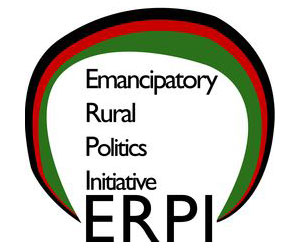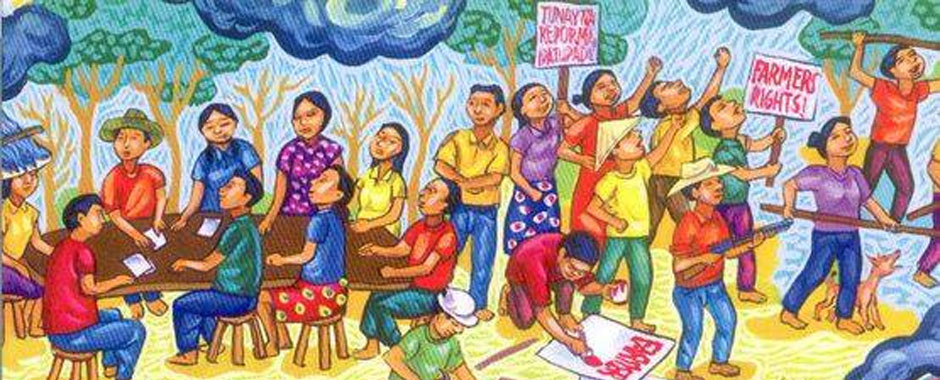The new Emancipatory Rural Politics Initiative (ERPI) has launched with a call for small grants applications. The grants will fund working papers and fieldwork to generate new, empirical reflections and analysis on authoritarian populism and the rural world.
About ERPI
 Deepening inequalities, failed livelihoods, mass (under)employment, climate chaos and racist anti-immigrant attacks characterise many settings across the world. Forms of ‘progressive neoliberalism’ — peddled inaccurately as social democracy — have failed to stem disillusionment, disenfranchisement and marginalisation. The rise of populist, nationalist movements — with racist, misogynist and isolationist characteristics — has been one very visible response. Such exclusionary politics are unravelling protections for women, racial minorities, disabled people, LGBTQ communities and many others. This type of populism depicts politics as a struggle between ‘the people’ and some combination of malevolent elites and racialized, unfairly advantaged ‘Others’.
Deepening inequalities, failed livelihoods, mass (under)employment, climate chaos and racist anti-immigrant attacks characterise many settings across the world. Forms of ‘progressive neoliberalism’ — peddled inaccurately as social democracy — have failed to stem disillusionment, disenfranchisement and marginalisation. The rise of populist, nationalist movements — with racist, misogynist and isolationist characteristics — has been one very visible response. Such exclusionary politics are unravelling protections for women, racial minorities, disabled people, LGBTQ communities and many others. This type of populism depicts politics as a struggle between ‘the people’ and some combination of malevolent elites and racialized, unfairly advantaged ‘Others’.
Yet the reactions to authoritarian populism are incredibly diverse, across and indeed within countries. In this Initiative, we are interested in changes ongoing in and in relation to rural areas that both give rise to a particular form of politics, but also offer alternatives. Whether in the US, across Europe, Turkey, India, the Philippines, Brazil or South Africa – and many other countries besides – various forms of reactionary nationalism have entrenched a narrow, sometimes violent, conflictual, exclusionary politics. This may be in the name of ‘taking back control’ in favour of ‘the people’, or putting one ideology and position ‘first’, while excluding others, generating tensions across society. All are responses to crises in contemporary capitalism, yet they are rooted in specific histories, institutional and social structures and political dynamics. Responses may be contradictory: for example shoring up a certain style of political power, while selectively offering progressive policies, whether free education, land reform or investment in rural communities.
The Emancipatory Rural Politics Initiative (ERPI) is focused on the social and political processes across rural spaces that are giving rise to such political reactions today. We seek to understand – but not judge – the characteristics of the social base that give rise to such political dynamics. We also aim to explore how alternatives are being actively generated to regressive, authoritarian politics. We seek to create the space for a debate about alternatives, documenting, analysing and theorising these in order to begin to outline new emancipatory politics that challenge narrow, exclusionary, violent and populist visions, analysing, sharing, supporting, deepening and scaling up alternatives.
Activities
With this call we seek to engage scholars, activists, and practitioners from across the world who are both concerned about the current conjuncture, but also hopeful about alternatives. As outlined below, we will initiate a Working Paper series, supported by a limited number of small grants, to allow for the writing up of original research. In parallel we are inviting other, shorter contributions in a variety of media, helping to map out responses and alternatives.
The Initiative will hold a major conference in early 2018, bringing this work together, with the aim of thinking together about new directions, both for academic research and practical action. We will be encouraging publication of a series of papers in the Journal of Peasant Studies, as well as other popular and media outlets, as a focus for an intense, informed and radical engagement around this theme. We hope others in social movements, political formations, policy institutions, and elsewhere will participate, developing new visions that respond to the current moment.
1. Core themes
We propose three core themes for the Initiative:
(i) The current conjuncture: rural roots and consequences
(ii) Resisting, organising and mobilising for an emancipatory rural politics
(iii) Alternatives: understanding, supporting, creating, deepening and scaling
2. What is to be done? A Challenge for scholar-activists
The urgent tasks are numerous. Given the challenges, resistance must be big, wide and insurgent. Yet, the ranks of scholar-activists within academic institutions are relatively thin. However modest our capabilities and resources, we can nevertheless do something that can make an important contribution to wider, global resistance. Our contribution has two important characteristics. It is coordinated by a network of scholar-activists/activist-scholars largely working in academic and independent research institutions, in both the global North and South, and it brings insights to our analysis of and political action around the current conjuncture from longstanding work with a rural perspective. By doing this we hope that we can make a small contribution in sharpening our analysis of the global situation, and by doing so, help inspire more people to join in peoples’ movements, community conversations and local innovations and experiments, wherever these may be.
3. Provisional questions
Under our three core themes, some possible questions for further exploration are outlined here. These are indicative, and not restrictive. There are many, many more, so please do frame and explore them, as long as they broadly link to our core themes and wider political project.
4. What are we proposing?
Our initial aim is to kick-start a wide, informed conversation on the themes outlined above, creating a platform for onward debate and action. In this context, we are inviting both short contributions in a range of formats and research-based papers for a new Working Paper series that addresses the themes above. All contributions must be rooted in recent engagements in rural transformation and politics, speaking to particular contexts and experiences, from anywhere in the world. We encourage in particular collaborations between academics and activists/practitioners.
Call for applications: small grants
We have a limited number of $2000 small grants available for those aiming to produce Working Papers, allowing perhaps additional fieldwork to supplement work already done. If you wish to apply for one of these grants, the deadline is 30 June 2017. Final papers are due at the latest on 1 January 2018. Please send a short application, including a one-page abstract, a half-page-word statement on a how you will spend the funds, and a half-page short bio of all proposed authors, including name, background, affiliation and country of residence – all these in one Word file. Applications should be sent to the email address [email protected], with the subject line marked ERPI SMALL GRANT APPLICATION.
Beyond those contributing directly, we invite any researchers and activists interested in this area of work and keen to keep in touch to sign up, via social media and email. Please let people know about this Initiative!
For now, we can remain in touch via the Initiative’s email address: [email protected]. You can also follow the ERPI on Facebook and Twitter.
Coordinating collective
Ian Scoones (STEPS Centre/IDS Sussex), Wendy Wolford (Cornell University), Marc Edelman (City University of New York), (Ruth Hall, PLAAS University of the Western Cape), Ben White (ISS, The Hague), Jun Borras (ISS, The Hague), Agrarian & Environmental Justice Program of the Transnational Institute (Lyda Fernanda, Pietje Vervest and Jennifer Franco), ICAS: Alberto Alonso-Fradejas, Zoe Brent, Liu Juan, Natalia Mamonova, Elyse Mills, Tsegaye Moreda, Salena Tramel).

I intend to apply.
Good luck!
how do we apply?
See the section entitled “Call for Applications: Small Grants” in the text above. If you get stuck, please email [email protected] with your specific question and they should be able to help.
Nathan
very interesting!
Could be challenging in more ways than one. Hence sharing with Pakistan Fisherfolk Forum (pff) whose Chair is concurrently Chair World Forum of Fisher Peoples (wffp). Also with Pakistan Institute of Labour Education & Research (piler) whose activist research includes peasants and rural workers.
Thanks, Aly!
We are farmers movement in Thailand, can we apply?
hello
yes, the call is open to anyone – it is designed to fund research and the writing of papers. Please email [email protected] if you have any questions about what is required for your application.
This is part of what we are doing with rural youth in Nigeria here and we will like to get engage in this initiative and take it to other African countries .